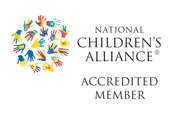If We can Protect Ourselves from the Pandemic, Why Can’t We Protect Our Children from Sexual Abuse?
April 15, 2021
As we continue to vaccinate and emerge from the darker days of the COVID-19 pandemic, I take pause to think about how our perceptions and behaviors have changed, possibly for good. When I watch TV or movies, for example, with folks crowded together in tight spaces not wearing masks, I can’t help but shudder and think, “Too close!” Similarly, if I leave the house without a mask or hand sanitizer, there’s a slight onset of panic. We all have adopted basic safety behaviors to protect ourselves and our neighbors from COVID-19. We have changed the way we live and our perceptions about risk to stay safe. We know what to do prevent it, and most of us have done so.
But what have we done to prevent child sexual abuse?
The answer is simple: not enough.
The casualties and fallout from COVID-19 are devastating and tragic. There is no question about that. But so, too, are the statistics about child sexual abuse. Research shows that one in four girls, and one in six boys are sexually abused before their 18th birthdays. Most victims suffer in silence, as it is estimated that more than 90 percent of abuse victims never report what happened to them. Are we are going to continue to let this happen?
If we can find a way to protect ourselves from a pandemic that has killed millions of people this year, we can absolutely find a way to protect our children.
What if we only knew about 1 in 10 cases of COVID-19 infection? What if we had no way to detect it other than by self-report, and there was no such thing as contact tracing? We might all still be in lockdown, without a vaccine, and infections would continue to surge. We must apply this same rationale to stopping the incidence of child sexual abuse.
If we can find a way to protect ourselves from a pandemic that has killed millions of people this year, we can absolutely find a way to protect our children.
April is National Child Abuse Prevention Month, which is why we are urging our community to come together to make a difference. We ask that parents and caregivers have the conversations about body safety, regularly and often, with their children, their families, and friends. This includes which parts of their bodies are private, not to be touched by anyone, and reminding them they need to immediately tell an adult they trust if someone does touch them inappropriately. If parents and caregivers have concerns that a child isn’t safe, they must reach out for help. It can be awkward, but it’s necessary. It can prevent child sexual abuse.
By shining a light on these “taboo” topics, we can remove stigma and foster change.
Adverse childhood experiences leave a lasting impact on children that may follow them for a lifetime. Per the CDC, these experiences can increase the risks of injury, maternal and child health problems, teen pregnancy, involvement in sexual exploitation, and a wide range of chronic diseases and leading causes of death, such as cancer, diabetes, heart disease, and suicide. By shining a light on these “taboo” topics, we can remove stigma and foster change. We have learned that changing our perceptions, responses and behaviors is effective in quelling a pandemic, and the same thing is true for our behaviors and perceptions surrounding child sexual abuse.
Even in these challenging times, we can work together to create a community where children are free of abuse, have a voice that is heard, and where they enjoy healthy, safe, and empowered lives.






